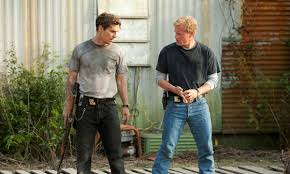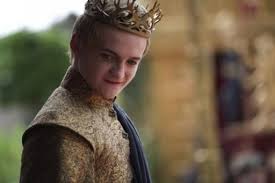
On a scene by scene basis, “The Secret Fate Of All Life” is as grim and unsettling as any other episode of True Detective.
There’s the normal murder and nihilistic grumblings, plus kids locked
in crates and increasingly disturbing Hart family drama, and even the
detectives’ vanquishing of Ledoux and closing of the Lang case is
undercut by our knowledge that the triumph is based on a narrative that
is false not only in the details, but in the assumption that it means
the end of the killings. But I also found the episode tremendously
encouraging in terms of the metagame TD’s been playing
with its framing structure. I enjoy some structural experimentation as
much as the next pretentious internet writer-type, but I am glad that
the 1995 segment has closed out and the 2012 storyline will not play out
entirely within the confines of the interviews, leading up to the
dramatic confession that one of the main guys has been the killer all
along, which is about the only twist possible if they were to remain in
that restrictive environment.
Which is not to say I have hated the interview aspect. Harrelson and
McConaughey have done a great job carrying it, and it’s actually at its
most effective this week, as it begins to contrast in earnest the
falsehoods the detectives are telling the interviewers with the reality
of how the showdown at Ledoux’s cook site played out. This keeps us a
little off balance, when the framing device could easily rob all tension
from the proceedings. Between this and last week’s masterful closing
sequence, it’s to Pizzolato and Fukunaga’s credit that they have managed
to make it work as effectively as a thriller as they have in spite of
our foreknowledge that the only developed characters will make it out of
the dangerous situations of 1995 unscathed.
 |
Of course, we also build dread as they continually fail
to see the disappointment of The Phantom Menace
looming in front of them
|
No, my main issue with the interviews has been the nagging suspicion
that they were building up to that twist I mentioned. Now, maybe you
like that kind of thing, and more power to you if so. But me, I’m a
simple kind of man. I like butter in my ass, movement in my plots,
genuine uncertainty in my suspense, and my narratives to play fair with
the audience and make a modicum of goddamn sense in hindsight. That’s
just me. And it means that I generally disdain twist endings. Oh, I
love me a
twist, if it’s setting up a conclusion and not constituting the conclusion in itself (so without getting into specifics: yay,
Fight Club and
Psycho! Boo,
Usual Suspects
and Shyamalan!). There are twist endings that work, but they’re few
and far between, and generally fit better onto shorter narratives, in my
opinion. Particularly in the internet age, hinging a longform
narrative on a shocker ending is a recipe for disappointment and
discontent.
 |
“How could I commit the sin of bringing a child into
a world that contains the final season of LOST?”
|
What this means is that I am happy that we will be getting a proper
third act in 2012, and that both our leads are effectively exonerated as
suspects. I know the big “reveal” of the episode is that the
interviewers like Cohle as the culprit in the new murders, but we and he
have been on to that from the jump, and you don’t put those cards on
the table in episode 5 if it’s supposed to be the shocking finale to the
series. And Marty, well he’s got issues with anger and women, but he’s
not the type to go in for the occult, or to have metapyschoses or
paraphillic love maps in his repertoire. “Do you know the good years
when you’re in them? Or do you just wait for them until you get ass
cancer, and realize that they came and went?” is not the sort of
sentiment I’d expect to hear from a man who carries out sadistic,
ritualistic serial murder. It’s a great line, but I’ll court
controversy and say this for the serial killers: I don’t think they are
prone to doubts about whether they’re making the most of their days or
really leaving their mark on the world.
 |
Diem: Pretty Well Carpe‘d.
|
Plus Marty would never allow his daughters to be hurt, and while we
see that none of his family is the most recent victim in 2012, it’s
looking more and more like Audrey is growing into precisely the sort of
troubled, probably substance-addled woman that the cult targets. Really
I base this more on the transitional shot of the tiara she threw in the
tree fading to resemble one of their wicker symbols than anything, but
it makes me nervous all the same. Symbolism has been kind of a thing
with this show, after all. Like for example Ledoux’s (who, along with
his partner, is creepy and philosophical to such an extreme degree that
even a Debbie Downer like Cohle snaps at him to shut the fuck up
already) talk about the black stars (and note the asterisks on the
windows framing Cohle as he investigates the abandoned school) and time
as a flat circle, which leaves an impression on Rust. To hear he/they
tell it, this means that we are locked into repeating the same events
over and over again, our lives an endless, repetitive cycle. Or perhaps
an endlessly downward spiral, such as the Ledoux’s flat, circular
tattoo suggests. Now, this is a bunch of BS, if you ask me. My own
understanding of the 4
th dimensional shit Rust spouts at the
table indicate that time certainly exists, it’s just not as linear and
immutable as it seems to us. But TV show doesn’t necessarily have to
conform to my own views of reality, and we are seeing the characters
repeating the same scenes again and again. Marty and Rust give the
same, fabricated account of the “shootout” to the review board in 1995
as they are giving again in 2012. Rust is again pouring over cold case
files and examining woven statuettes in creepy abandoned buildings (not
to mention visiting the site where Lang was found) in 2002, just as he
did in 1995. Maggie takes Marty back, despite the cycle of infidelity
and neglect that has come to define their marriage (all while the girls
take “one more lap” around the roller rink). She’s also the one who
insists on setting up Cohle repeatedly, despite his obvious defects as a
mate. But of course the big one is that these murders will continue as
long as there is a horrific Yellow King out there.
 |
And with HBO’s current slate of original programming, that will be quite awhile
|
I won’t try to rehash who the Yellow King is, or pretend I knew about this before reading
this link in
another review (TL; DR version: The Yellow King is a sinister figure
who rules over Carcossa, a place of madness and despair that has also
been referenced multiple times by Ledoux and other cult-adjacent
figures). It seems that in this context, he will be the leader of the
cult, or
leaders, if the mantle has been passed in the interim
between 95 and the “present” day. And as I type that, I’m starting to
wonder if in the end Cohle might not be faced with the decision whether
to embrace the demon Ledoux’s partner references in the opening and
become the Yellow King himself, or to remain the titular detective?
Nah, that’d be pretty crazy. The type of twist that could only fit in a
place of utter madness and despair.





No comments:
Post a Comment